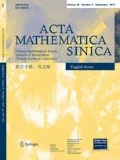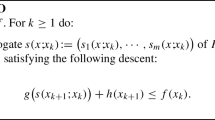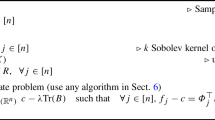Abstract
We present a partial first-order affine-scaling method for solving smooth optimization with linear inequality constraints. At each iteration, the algorithm considers a subset of the constraints to reduce the complexity. We prove the global convergence of the algorithm for general smooth objective functions, and show it converges at sublinear rate when the objective function is quadratic. Numerical experiments indicate that our algorithm is efficient.
Similar content being viewed by others
References
Adler, I., Resende, G. C., Veiga, G., et al.: An implementation of karmarkar’s algorithm for linear programming. Math. Programming, 44(1), 297–335 (1989)
Barnes, E. R.: A variation on karmarkar’s algorithm for solving linear programming problems. Math. Programming, 36(2), 174–182 (1986)
Bellavia, S., Macconi, M., Morini, B.: An affine scaling trust–region approach to bound–constrained nonlinear systems. Appl. Numer. Math., 44(3), 257–280 (2003)
Bonnans, J. F., Pola, C.: A trust region interior point algorithm for linearly constrained optimization. SIAM J. Optimiz., 7(3), 717–731 (1997)
Byrd, R. H., Gilbert, J. C., Nocedal, J.: A trust region method based on interior point techniques for nonlinear programming. Math. Programming, 89(1), 149–185 (2000)
Byrd, R. H., Hribar, M. E., Nocedal, J.: An interior point algorithm for large–scale nonlinear programming. SIAM J. Optimiz., 9(4), 877–900 (1999)
Coleman, T. F., Li, Y.: A trust region and affine scaling interior point method for nonconvex minimization with linear inequality constraints. Math. Programming, 88(1), 1–31 (2000)
Dantzig, G. B., Ye, Y.: A build–up interior–point method for linear programming: Affine scaling form. Tech. Rep., Department of Management Science, University of Iowa, Iowa City IA, 1991
Dikin, I. I.: Iterative solution of problems of linear and quadratic programming. 8(8), 747–748 (1967)
Gonzaga, C. C., Carlos, L. A.: A primal affine–scaling algorithm for constrained convex programs. Report ES–238/90, COPPE–Federal University of Rio de Janeiro, 1990. Revised in September, 2002
Hoffman, A. J.: On approximate solutions of systems of linear inequalities. J. Research National Bureau Standards, 49(4), 263–265 (2015)
Garbow, J. J. B. S., Hillstrom, K. E.: Algorithm 566: Fortran subroutines for testing unconstrained optimization software [c5], [e4]. ACM Trans. Math. Software, 7(1), 136–140 (1981)
Mangasarian, O. L.: A simple characterization of solution sets of convex programs. Operations Research Letters, 7(1), 21–26 (1988)
Monma, C. L., Morton, A. J.: Computational experience with a dual affine variant of karmarkar’s method for linear programming. Operations Research Letters, 6(6), 261–267 (1987)
Monteiro, R. D. C., Wang, Y.: Trust region affine scaling algorithms for linearly constrained convex and concave programs. Math. Programming, 80(3), 283–313 (1998)
Tits, A., Absil, P. A., Woessner, W. P.: Constraint reduction for linear programs with many inequality constraints. SIAM J. Optimiz., 17(1), 119–146 (2006)
Tseng, P.: Partial affine–scaling for linearly constrained minimization. Math. Operations Research, 20(3), 678–694 (1995)
Tseng, P., Bomze, I. M., Schachinger, W.: A first–order interior–point method for linearly constrained smooth optimization. Math. Programming, 127(2), 399–424 (2011)
Vanderbei, R. J., Meketon, M. S., Freedman, B. A.: A modification of karmarkar’s linear programming algorithm. Algorithmica, 1(1), 395–407 (1986)
Waltz, R. A., Morales, J. L., Nocedal, J., et al.: An interior algorithm for nonlinear optimization that combines line search and trust region steps. Math. Programming, 107(3), 391–408 (2006)
Wang, X., Yuan, Y. X.: A trust region method based on a new affine scaling technique for simple bounded optimization. Optimization Methods & Software, 28(4), 1–18 (2013)
Winternitz, L. M. B.: Primal–dual interior–point algorithms for linear programs with many inequality constraints. Dissertations & Theses–Gradworks, University of Maryland, College Park, Md., 2010
Author information
Authors and Affiliations
Corresponding author
Additional information
This paper is partially supported by NSFC (Grant Nos. 11331012 and 11461161005)
Rights and permissions
About this article
Cite this article
Gu, R., Yuan, Y.X. A Partial First-Order Affine-Scaling Method. Acta. Math. Sin.-English Ser. 35, 1–16 (2019). https://doi.org/10.1007/s10114-017-7097-z
Received:
Revised:
Accepted:
Published:
Issue Date:
DOI: https://doi.org/10.1007/s10114-017-7097-z




